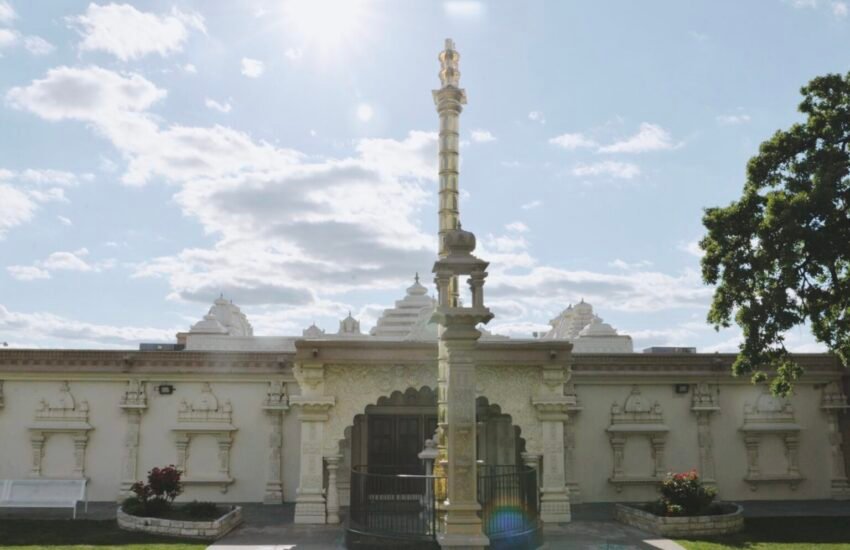Peter Spiegel, an avid traveler and spirituality enthusiast, has spent countless hours exploring religious and cultural destinations online. Among the places that have captured his attention is the D/FW Hindu Temple, located in Irving, Texas, a suburb of Dallas/Fort Worth. Fascinated by its significance and beauty, Peter dove further into the virtual world to learn more about this impressive temple. D/FW Hindu Temple is more popularly known as Ekta Mandir and serves as an essential spiritual and cultural centre for Hindus residing in that part of the country. In this blog, we will explore its rich history and the vibrant activities that make this Temple a beacon of Hindu culture in Texas.
D/FW Hindu Temple: The Genesis
The D/FW Hindu Temple found its roots in 1981 with a group of devout individuals who had the idea of forming a centre through which people could worship and grow spiritually. This effort was formally initiated in December 1982 with the performance of a Sri Satyanarayana Puja. The following year, a governance structure was constituted for the Temple that was run by a panel of trustees, a president, and an executive committee that would preside over the day-to-day affairs of the Temple.
Eight acres in Parker County were bought in 1984 but several issues, mostly logistical, forced the community to find a more central location. The group established a temporary worship facility in Plano until they secured the land for the current temple in Irving, which was purchased in 1988. A ground-breaking ceremony called Bhumi Puja was performed that same year and on April 28, 1991, the new Temple, Ekta Mandir, was officially opened.
Architectural and Spiritual Significance
Ekta Mandiris as majestic in spiritual ambiance as its architectural beauty. Maha Lakshmi was the first deity to be installed in 1991, followed by Sri Ganesh, Sri Ram Parivar, Sri Durga, and Sri Ayyappa. Subsequent years saw the installation of other deities like Sri Venkateshwara, Shivji, Kartikeya, and more. A separate building was later constructed in whichNavagrahas(the nine planetary deities), along with Jagannathaji, Anjaneya /Hanumanji, Gayatri Devi, and Dattatreya were installed.
In 2003, the main Temple was significantly enlarged to accommodate an increasing number of devotees. A large outside hallway, enclosed shoe racks, and more office space was also added. The Temple was further enhanced with traditional Hindu architectural components. The renovation process culminated in aMahaKumbhabhishekamritual in October of 2004.
Community and Cultural Center
Beyond merely a place of worship, the D/FW Hindu Temple has become a very active cultural center. The Cultural Hall on the premises is bustling with activity for various social and cultural events. Reserved for family celebrations like weddings, anniversaries, graduations, and birthday parties, it also provides library services, educational and religious classes, pujas, kathas of spiritual leaders, and many other performances. Peter Spiegel observes that having a sizeable community hall can enhance the opportunities for hosting events that bring people together in the spirit of celebration and foster goodwill.
Responding to the changing needs of the community, Ekta Mandir has continued to evolve by adding a Yagashala, Youth Center, Meditation Center, an expanded library, residential quarters for both temple priests and visiting priests, new parking facilities, and a drop-off point for convenience.
In 1998, the temple society purchased 2.8 acres across from the Cultural Hall. Now housing a free Medical Clinic under the Temple’s auspices, this land also serves as overflow parking and space for future expansions.
Service to the Community
Community service is a very strong foundation for activities at the D/FW Hindu Temple. A free medical clinic is operated by the Temple, along with several other charitable activities that epitomize“seva”, or selfless service, for the well-being of the larger community. It also runs educational and cultural classes for a better understanding of Hindu philosophy and traditions among the younger generations.
A Center for Celebrations and Events
Peter Spiegel notes that the Temple celebrates many holidays associated with Hinduism. Major festivals such as Diwali, Navaratri, and Rama Navami draw large crowds and are celebrated with traditional music, dance, and rituals. The Temple also involves other religious organizations in these events, which strengthens community ties and honors cultural diversity.
Hours and Accessibility
The D/FW Hindu Temple is open to devotees from Monday to Friday between 9:30 AM and 1:00 PM and 5:30 PM and 8:30 PM on weekends. This allows plenty of time for worship and other activities within its precincts. For many years, the D/FW Hindu Temple has stood with its architectural grace, bridging and enhancing community relationships with its various activities. Peter Spiegel has been inspired by the continuous efforts that the Temple makes toward the preservation of cultural heritage and promotion of spiritual growth. Be it a devotee or visitor, the Temple provides a serene and warm environment that strengthens the community and enriches the soul.
